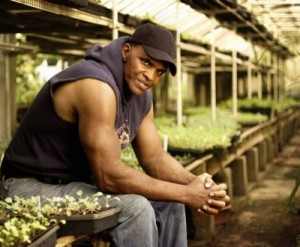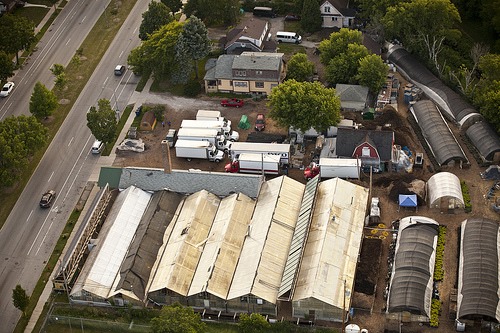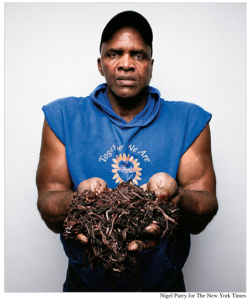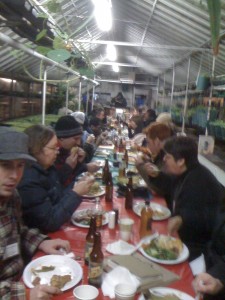
Will Allen, chief executive officer of Growing Power, a 40-acre fleet of urban farms outside of Milwaukee, believes in building ecology, minds and community through farming. “If people can grow safe, healthy, affordable food, if they have access to land and clean water, this is transformative on every level in a community. I believe we cannot have healthy communities without a healthy food system.”
What started as a small business venture evolved into a small nonprofit through which Allen taught youth where their food came from by having them participate in his farm activities. This eventually transformed into a major multifaceted organization with a $6-million budget that teaches people all over the world about urban and sustainable farming.
Growing Power’s prototype for a successful Community Food Center is its Milwaukee headquarters, the organization’s first food production site. Allen bought the three-acre farm in 1993, and it was the last farm in the city at the time. At the site, there are six traditional greenhouses, various types of hoop houses (which have different focuses, such as aquaponics and poultry), an apiary with nearly 20 beehives, outdoor pens for livestock, an anaerobic digester, a rain catchment system and a retail store. The store sells produce, meat, worm castings and compost. The farm serves as a site for national workshops and a learning facility for schools, universities, government agencies, corporations, farmers, activists and community members.

“The idea is to teach urban agriculture methods that focus on environmental sustainability,” Allen said, noting that the organization trains more than 1,000 farmers a year.
“In terms of taking up farming, instead of acres, think of square footage and intensive agriculture,” Allen said. “To do that, you have to have really good soil fertility. … The fertility of the soil means that you can grow plants closer together in smaller spaces and use space using multiple-level growing—getting very creative—versus growing on one plane like (many farmers) do.”

The most essential step in converting abandoned lots into urban intensive farms is building soil fertility. Growing Power receives waste from local breweries and Walmart and other sources. These discarded scraps are composted into extremely fertile soil through vermicomposting (composting with worms).
Allen is also a pioneer in the development of advanced aquaponics techniques, and his methods are being studied for application all over the world. Aquaponics is the marriage of aquaculture and hydroponics. Tropical fish such as tilapia are raised in ponds within the greenhouses. The water is cleaned by pumping it through grow beds verdant with vegetables of all types. As fish waste is an almost-perfect fertilizer, the fish assist with growing crops, while the plants clean the water for the fish. In the end, this system produces both vegetables and fish meat for human consumption. The fish waste is low in certain types of nutrients that plants need, such as boron, so Allen has developed a supplementation method in which compost and worms are added to the growing beds. The worms also become fish food when they eventually fall into the water.
The son of a share-cropper and former professional basketball player, Allen is all-too-familiar with the food deserts of poor urban communities. Located 5 blocks from a public housing facility, the headquarters of Growing Power is 3.5 miles from the nearest grocery store. Three and a half miles might not seem like much, but for an underprivileged population without cars, it can be prohibitive. This urban population can now buy extremely fresh organic produce locally at affordable prices at Growing Power’s farmstand. Growing Power welcomes anyone who is interested in urban sustainable food systems, renewable energy, the environment, and of course, food, to participate in the many educational opportunities the organization offers. In particular, Growing Power provides regular trainings, resource development, technical support and outreach for limited resource farmers and socially disadvantaged communities.
 Banquet with students in the greenhouse
Banquet with students in the greenhouse
Using methods he has developed over a lifetime, Allen trains community members to become community farmers, assuring them a secure source of good food without regard to political or economic forces. Allen was awarded a Ford Foundation leadership grant on behalf of his urban farming work. In 2008, he was awarded the MacArthur Foundation “Genius Grant” for his work on urban farming and sustainable food production. In 2010 Mr. Allen joined First Lady Michelle Obama as she launched the White House’s “Let’s Move” campaign to address issues affecting American youth and the risk of obesity and Mr. Allen was also recognized as one of TIME magazine’s 100 Most Influential People in the World.
 First Lady Michelle Obama visits Growing Power
First Lady Michelle Obama visits Growing Power
Images by Growing Power and Seedstock.
Earth Day is Sunday April 22. Please honor your mother Earth by planting something.
